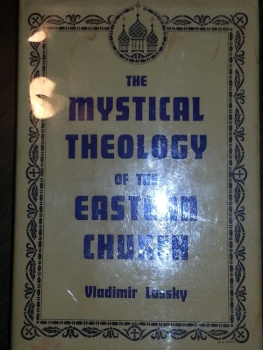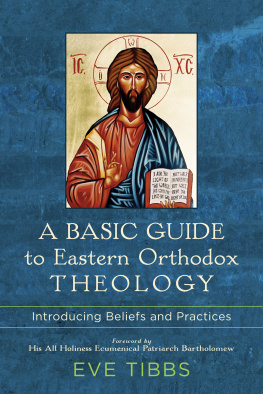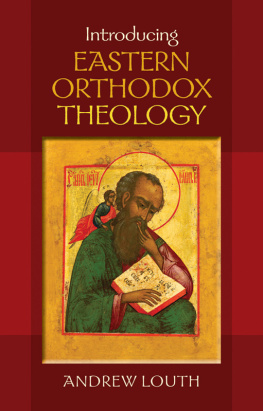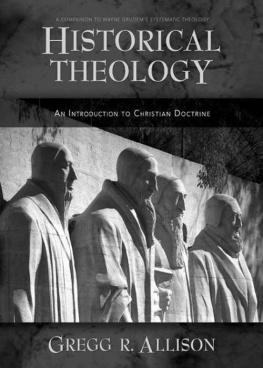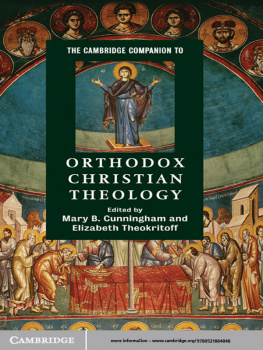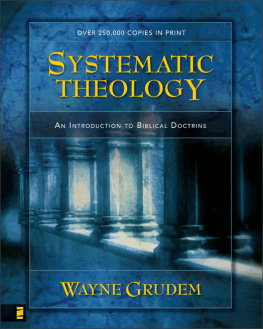The Mystical Theology
of the
Eastern Church
Vladimir Lossky

James Clarke & Co
Published by:
James Clarke & Co., Ltd
P.O. Box 60
Cambridge
CB1 2NT
www.jamesclarke.co.uk
publishing@jamesclarke.co.uk
This translation first published 1957
Printed 1968 and 1973
First Paperback edition 1991
Reprinted 2005
The Mystical Theology of the Eastern Church was first published in
Paris in 1944 as Essai sur la Theologie Mystique de lEglise
dOrient It has been translated by a small group of members of
the Fellowship of St Alban and St Sergius, which exists to promote
understanding between Eastern and Western Christians.
Copyright Vladimir Lossky, 1944
English Translation, Copyright James Clarke & Co., 1957
British Library Cataloguing in Publication Data
Lossky, Vladimir 19031958
The mystical theology of the Eastern Church
1. Orthodox Eastern Church. Christian Doctrine
I. Title II. Essai sur la Theologie Mystique de lEglise
dOrient
230.19
ISBN 978 0 227 90510 4
All rights reserved. No part of this publication may be
reproduced, stored in a retrieval system or transmitted in any form
or by any means, electronic, mechanical, photocopying, recording
or otherwise, without the prior written permission of the publisher.
Contents
I t is our intention, in the following essay, to study certain aspects of eastern spirituality in relation to the fundamental themes of the Orthodox dogmatic tradition. In the present work, therefore, the term mystical theology denotes no more than a spirituality which expresses a doctrinal attitude.
In a certain sense all theology is mystical, inasmuch as it shows forth the divine mystery: the data of revelation. On the other hand, mysticism is frequently opposed to theology as a realm inaccessible to understanding, as an unutterable mystery, a hidden depth, to he lived rather than known; yielding itself to a specific experience which surpasses our faculties of understanding rather than to any perception of sense or of intelligence. If we adopted this latter conception unreservedly, resolutely opposing mysticism to theology, we should be led in the last resort to the thesis of Bergson who distinguishes, in his Deux Sources, the static religion of the Churches from the dynamic religion of the mystics; the former social and conservative in character, the latter personal and creative.
To what extent was Bergson justified in stating this opposition? This is a difficult question, all the more so since the two terms which Bergson opposes on the religious plane are rooted in the two poles of his philosophical vision of the universenature and the lan vital. Quite apart from this attitude of Bergson, however, one frequently hears expressed the view which would see in mysticism a realm reserved for the few, an exception to the common rule, a privilege vouchsafed to a few souls who enjoy direct experience of the truth, others, meanwhile, having to rest content with a more or less blind submission to dogmas imposed from without, as to a coercive authority. This opposition is sometimes carried to great lengths, especially if the historical reality be forced into a preconceived pattern. Thus the mystics are set up against the theologians, the contemplatives against the prelates, the saints against the Church. It will suffice to recall many a passage of Harnack, Paul Sabatiers Life of St. Francis, and other works, most frequently by protestant historians.
The eastern tradition has never made a sharp distinction between mysticism and theology; between personal experience of the divine mysteries and the dogma affirmed by the Church. The following words spoken a century ago by a great Orthodox theologian, the Metropolitan Philaret of Moscow, express this attitude perfectly: none of the mysteries of the most secret wisdom of God ought to appear alien or altogether transcendent to us, but in all humility we must apply our spirit to the contemplation of divine things.a personal working out of the content of the common faith, theology is an expression, for the profit of all, of that which can be experienced by everyone. Outside the truth kept by the whole Church personal experience would be deprived of all certainty, of all objectivity. It would be a mingling of truth and of falsehood, of reality and of illusion: mysticism in the bad sense of the word. On the other hand, the teaching of the Church would have no hold on souls if it did not in some degree express an inner experience of truth, granted in different measure to each one of the faithful. There is, therefore, no Christian mysticism without theology; but, above all, there is no theology without mysticism. It is not by chance that the tradition of the Eastern Church has reserved the name of theologian peculiarly for three sacred writers of whom the first is St. John, most mystical of the four Evangelists; the second St. Gregory Nazianzen, writer of contemplative poetry; and the third St. Symeon, called the New Theologian, the singer of union with God. Mysticism is accordingly treated in the present work as the perfecting and crown of all theology: as theology par excellence.
Unlike gnosticism,dominated by the constant preoccupation which the Church has had to safeguard, at each moment of her history, for all Christians, the possibility of attaining to the fullness of the mystical union. So the Church struggled against the gnostics in defence of this same idea of deification as the universal end: God became man that men might become gods. She affirmed, against the Arians, the dogma of the consubstantial Trinity; for it is the Word, the Logos, who opens to us the way to union with the Godhead; and if the incarnate Word has not the same substance with the Father, if he be not truly God, our deification is impossible. The Church condemned the Nestorians that she might overthrow the middle wall of partition, whereby, in the person of the Christ himself, they would have separated God from man. She rose up against the Apollinarians and Monophysites to show that, since the fullness of true human nature has been assumed by the Word, it is our whole humanity that must enter into union with God. She warred with the Monothelites because, apart from the union of the two wills, divine and human, there could be no attaining to deificationGod created man by his will alone, but He cannot save him without the co-operation of the human will. The Church emerged triumphant from the iconoclastic controversy, affirming the possibility of the expression through a material medium of the divine realitiessymbol and pledge of our sanctification. The main preoccupation, the issue at stake, in the questions which successively arise respecting the Holy Spirit, grace and the Church herselfthis last the dogmatic question of our own timeis always the possibility, the manner, or the means of our union with God. All the history of Christian dogma unfolds itself about this mystical centre, guarded by different weapons against its many and diverse assailants in the course of successive ages.
The theological doctrines which have been elaborated To venture to pass any judgement upon the nature of this experience it would be necessary to understand it more fully than did St. Paul, who avows his ignorance: I cannot tell: God knoweth. We deliberately leave on one side all question of mystical psychology. Nor is it theological doctrines as such that we propose to set forth in the present work, but only such elements of theology as are indispensable for the understanding of a spirituality: the dogmas which constitute the foundation of mysticism. Here, then, is the first definition and limitation of our subject, which is the mystical theology of the Eastern Church.
Next page
